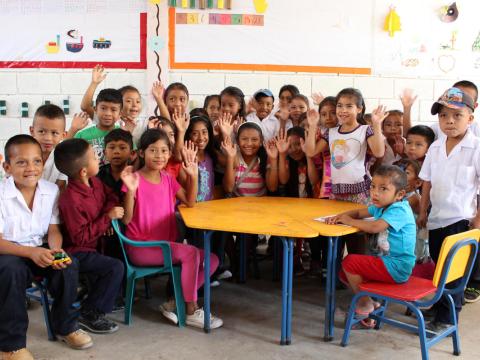More Than a Meal: How School Feeding is Nourishing Futures Across Latin America

In classrooms from the Amazon to the Andes, school meals are quietly transforming lives. What began as a basic nutritional intervention has become a critical lifeline for millions of children, families and communities across Latin America—helping them stay in school, stay healthy and stay hopeful. Through a patchwork of national programmes and civil society partnerships, including those led by World Vision, school feeding is now a cornerstone of educational and social policy in countries such as Venezuela, Brazil, Guatemala and Peru.
World Vision’s School Meals programming ensures that children in vulnerable communities receive the nourishment needed to succeed and is an essential part of our global ENOUGH campaign. This campaign aims to eliminate child hunger and malnutrition by providing every child with the food they deserve to develop a healthy body and mind.
In Venezuela, World Vision, in partnership with the World Food Programme (WFP), has expanded school feeding to reach 542 schools across five states. The programme benefits over 78,000 children through a mix of fresh food deliveries, on-site meals and fortified supplements such as Super Cereal. The impact is visible not only in improved nutrition but also in revitalised school environments. In Barinas, meals are now prepared and served daily in schools like Don Rómulo Gallegos, while kitchen upgrades in places such as CEI Josefa Camejo in Falcón have helped improve food safety and meal quality.
Brazil’s school feeding programme, known as PNAE (Programa Nacional de Alimentação Escolar), is one of the oldest of its kind. It ensures that children in public education have access to meals that reflect both their nutritional needs and cultural food preferences. World Vision Brazil has focused its efforts on youth engagement, supporting adolescent-led monitoring and advocacy. In 2024, as part of the “Amplifying Children's Voices Digitally (ACVD)” initiative, young people helped draft a letter calling for improved accountability in school meal delivery. The letter was delivered directly to government officials during the G20 Summit in Rio de Janeiro, a moment of visibility that underlined the importance of youth participation in shaping public services.
Policy change has been central to progress in Guatemala. In 2017, the government passed a landmark School Feeding Law, which was further strengthened in 2021. That reform increased daily funding per student from Q4.00 to Q6.00 (approximately US$0.52 to US$0.78) and expanded coverage to 3.6 million children, including those in early childhood and lower secondary levels. World Vision Guatemala played a central role in supporting the legislative process, providing input during congressional debates and advocating for long-term investment in child nutrition. Today, their work includes improving water and sanitation infrastructure in schools, equipping kitchens and running food demonstration workshops for parents using local ingredients.
In Peru, a different kind of transformation is underway, one that places children at the heart of food policy. Through a citizen engagement initiative called Voz y Acción Ciudadana, children and adolescents have been trained to evaluate and advocate for improvements to the national school feeding programme, now known as Wasi Mikuna. In 2024, this mobilisation reached over 21,000 students, parents and teachers. Youth leaders conducted public consultations, visited food storage facilities and met with government officials to share their proposals. Their efforts led to a formal commitment by authorities to improve training for food handlers, increase transparency and develop child-friendly communication about nutrition services.
These programmes are united through a recognition that school meals are not simply about hunger. They are about participation, dignity, potential and equal opportunity. For many children, the school day is the only time they can count on a nutritious meal. For families struggling with inflation, drought or displacement, this daily assurance brings measurable relief. And for governments, school feeding has proven to be an incredibly efficient tool to support educational outcomes, while also boosting local economies through the purchase of food from smallholder farmers and employment opportunities in the supply chain.
The work, however, is far from finished. Across the region, school feeding programmes face challenges, from underfunded budgets to logistical hurdles in remote communities. Climate change, rising food costs and political instability threaten to reverse gains made over the past decade. In this context, the role of international partners remains vital, not just as implementers, but as advocates, connectors and amplifiers of local voices.
It’s no coincidence that much of the progress seen in these countries has come where children and communities were directly involved. Whether through youth-led monitoring in Brazil and Peru, or parent-led cooking workshops in Guatemala, these programmes succeed because they’re rooted in the lived experiences of those they serve.
As global attention turns towards the upcoming Global School Meals Summit in Brazil this September, there is an opportunity and an obligation for donors, governments and civil society to reaffirm their commitments to school meals.
Ensuring every child has access to a nourishing school meal isn’t charity. It’s a matter of justice, equity and smart public policy.
Because in the end, a school meal is never just a plate of food. It’s a vote of confidence in a child’s future.
For more information, please visit our School Meals website at https://www.wvi.org/ENOUGH/school-meals